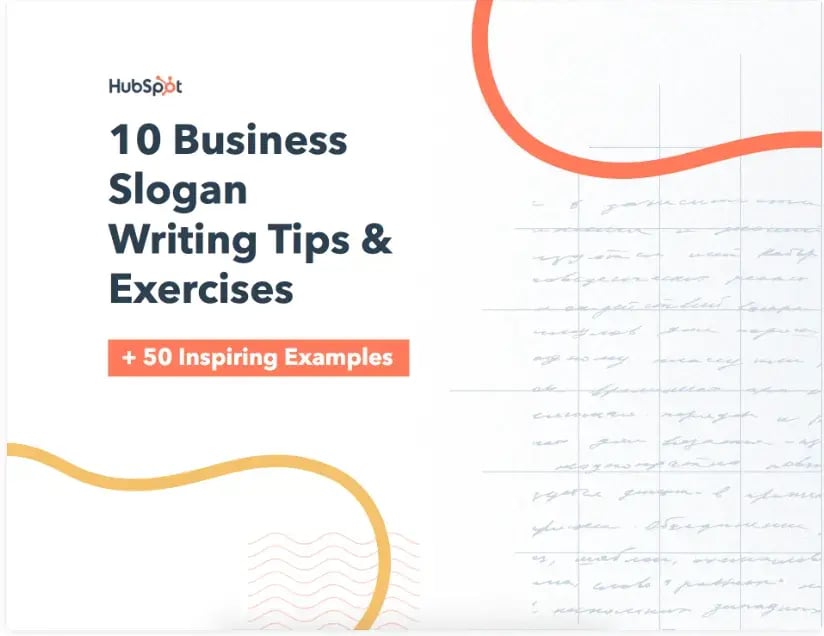31 Companies With Really Catchy Slogans & Brand Taglines
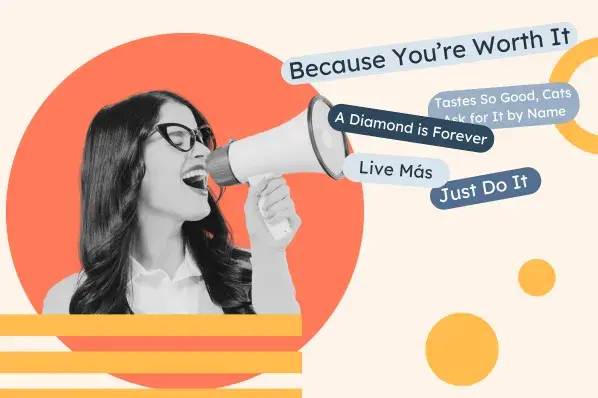
Any writer will tell you how hard it is to express a complex emotional concept in just a few words. But that’s exactly what great slogans and taglines do.
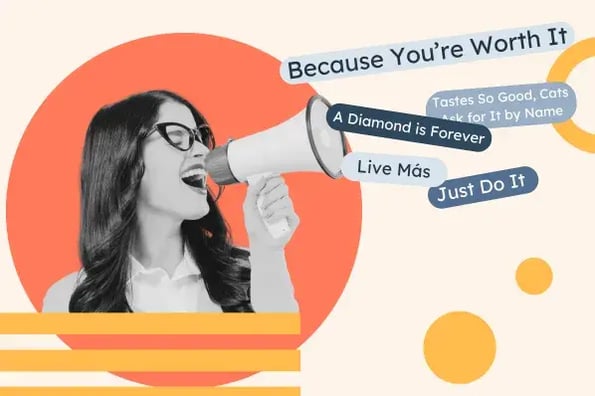
If you‘re looking to get a little slogan inspiration of your own, take a look at some of our favorite company slogans and taglines from both past and present.
But before we get into specific examples, let’s quickly go over what a slogan is, how it differs from a tagline, and what makes these branded one-liners stand out.
Table of Contents
What is a slogan?
In business, a slogan is “a catchphrase or small group of words that are combined in a special way to identify a product or company,” according to Entrepreneur.com’s small business encyclopedia.
In many ways, they’re like mini-mission statements.
Slogans are as essential to advertising as logos. While the latter visually represent a brand, slogans are verbal representations, which can make them snappier and easier to remember. Both formats grab consumers‘ attention more readily than a company’s name or product might.
The goal? To leave a key brand message in consumers‘ minds so that, even if they remember nothing else from an advertisement, they’ll be singing the slogan under their breath.
Slogan vs. Tagline
Although “slogan” and “tagline” tend to be used interchangeably, they serve two different purposes.
As I mentioned in Entrepreneur.com’s definition above, a slogan identifies a product or company. So does a tagline, for that matter. Where these terms differ is in how they position a company in its industry.
A slogan encompasses a company‘s mission, what it stands for, and even how it’s helping customers in the individual campaigns the company might run. Slogans can therefore be longer than taglines, as you’ll see in the list below.
A tagline is a catchy quip that evokes an image of your brand in the minds of your customers. Taglines enable people to make lighthearted associations with your business: “When I see [tagline], I think [company].”
Featured Resource: 50 Slogan Writing Tips & Examples
Taglines are often next to the company‘s logo on official advertisements and are more specific to brand awareness than slogans.
Slogans carry a brand’s values and promises as the company grows and evolves, and can be promoted under an overarching company tagline.
Your organization doesn’t have to develop both a slogan and a tagline — it might succeed with just a solid, recognizable tagline.
But as you develop new products and identify new types of customers, you might find your brand launching a campaign that is primed for its own slogan.
What makes a great slogan?
According to HowStuffWorks, a great slogan has most, or all, of the following characteristics:
1. It’s memorable.
Is the slogan quickly recognizable? Will people only have to spend a second or two thinking about it? A brief but strong few words can go a long way in advertisements, videos, posters, business cards, swag, and other places.
2. It includes a key benefit.
Ever heard the marketing advice, “Sell the sizzle, not the steak”? It means sell the benefits, not the features — which applies perfectly to slogans. A great slogan makes a company or product’s benefits clear to the audience.
3. It differentiates the brand.
Does your light beer have the fullest flavor? Or maybe the fewest calories? What is it about your product or brand that sets it apart from competitors? (Check out our essential branding guide.)
4. It imparts positive feelings about the brand.
The best taglines use words that are upbeat.
For example, Reese‘s Peanut Butter Cups’ slogan, “Two great tastes that taste great together,” gives the audience good feelings about Reese‘s, whereas a slogan like Lea & Perrins’ “Steak sauce only a cow could hate,” uses negative words.
We could argue that the former leaves a better impression on the audience.
How to Write a Catchy Slogan or Tagline
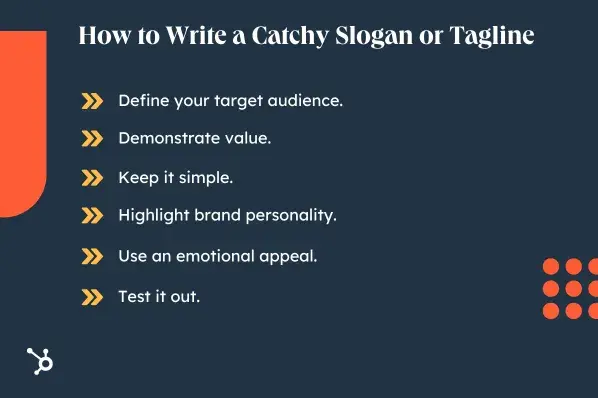
1. Define your target audience.
Determine who your brand is targeting and research their preferences and needs.
This step is crucial as it allows you to build a message that resonates with them, differentiate your brand, adapt your tone and language, and target the right channels.
2. Demonstrate value.
Focus on the main benefits that your brand offers to its customers. This could include convenience, quality, affordability, innovation, or any other unique selling points.
By doing this, you can motivate customers to take action, whether it’s making a purchase, exploring further, or developing a long-lasting relationship with your brand.
3. Keep it simple.
A successful slogan is short, impactful, and easy to remember. Strive for brevity while capturing the essence of your brand and its key benefits. Use powerful words, rhymes, alliteration, or wordplay to make it stand out.
4. Highlight brand personality.
Consider your brand’s personality and tone. Is it playful, professional, or innovative? Reflect this personality in the slogan to create a cohesive and authentic message.
5. Use an emotional appeal.
Create an emotional connection with your target audience by tapping into their aspirations, desires, or pain points. Emotionally appealing slogans tend to be more memorable and resonate with consumers.
6. Test it out.
Once you’ve drafted a catchy slogan, share it with a sample group of people from your target audience to get their feedback.
Ask for their impressions, memorable elements, and overall understanding. Make necessary adjustments based on the feedback received.
Now that we’ve covered what a slogan is and what makes one great, here are examples of some of the best brand slogans of all time.
When you want a brand slogan you want to make sure they are memorable and that they bring your brand to life.
The right slogan will have key words that encapsulate what your brand is so that consumers will always have it in the back of their heads.
Below we have listed some business slogans that range from fast food, cars, essential items, pet essentials, etc. to show that a good slogan encapsulates being concise, catchy, and classic.
Catchy Business Slogans and Taglines
HobNobs: “One nibble and you’re nobbled”
Taco Bell “Live Más”
CARFAX: “Show Me the CARFAX”
Pirelli: “Power is Nothing Without Control”
VRBO: Where Families Travel Better Together
Dollar Shave Club: “Shave Time. Shave Money.”
MasterCard: “There are some things money can‘t buy. For everything else, there’s MasterCard.”
Meow Mix: “Tastes So Good, Cats Ask for It by Name”
De Beers: “A Diamond is Forever”
M&M: “Melts in Your Mouth, Not in Your Hands”
Allstate: “You’re in Good Hands With Allstate”
Ronseal: “It Does Exactly What It Says on the Tin.”
The Mosaic Company: “We Help the World Grow the Food It Needs”
Target: “Expect More. Pay Less.”
Nike: “Just Do It”
Apple: “Think Different.”
L‘Oréal: “Because You’re Worth It”
California Milk Processor Board: “Got Milk?”
BMW: “Sheer Driving Pleasure”
Tesco: “Every Little Helps”
Bounty: “The Quicker Picker Upper”
Lay‘s: “Betcha Can’t Eat Just One.”
Dunkin’: “America Runs on Dunkin”
McDonald‘s: “I’m Lovin’ It”
The New York Times: “All the News That’s Fit to Print”
General Electric: “Imagination at Work”
State Farm: “Like a good neighbor, State Farm is there.”
Maybelline: “Maybe she‘s born with it. Maybe it’s Maybelline.”
The U.S. Marine Corps: “The Few. The Proud. The Marines.”
Capital One: “What’s in Your Wallet?”
Toyota: “Let’s Go Places”
1. HobNobs: “One nibble and you’re nobbled”
HobNobs are an oaty British biscuit (cookie), some varieties of which are half-covered in milk or dark chocolate. (I recommend the milk chocolate ones, if you can find them.)
It launched in 1985 with the slogan, “One nibble and you’re nobbled.”
What I like: “One nibble and you’re nobbled” is fun to say — it’s just that simple. Even if you’re not familiar with the word “nobble” (it’s slang for “winning over to one’s side”), the alliteration is delightful and captures the playfulness of the brand and product.
2. Taco Bell “Live Más”
“Live Más,” or “live more,” was launched in 2012 as part of a Taco Bell brand revamp. In 2022, the brand partnered with Doja Cat to “redefine” Live Más as “celebrating that little bit of different that lives in all of us.”
What I like: “Live Más” can be interpreted in a fairly unserious way — life’s too short not to eat more tacos, a sentiment nobody could disagree with. But it can also take on a more serious exhortation to live life to the fullest, something that Taco Bell has backed up with the Live Más Scholarship, launched in 2016 by the Taco Bell Foundation.
3. CARFAX: “Show Me the CARFAX”
What I like: Riffing on a pop culture catchphrase (Jerry Maguire’s “Show me the money!), “Show Me the CARFAX” works as both an ad slogan and a practical reminder for car buyers.
4. Pirelli: “Power is Nothing Without Control”
What I like: Safety is surely the most important feature in a set of car tires, but how do you make “safety” sound more exciting than a minivan? By balancing it with the fun reason somebody would want Pirellis: fun.
5. VRBO: “Where Families Travel Better Together”
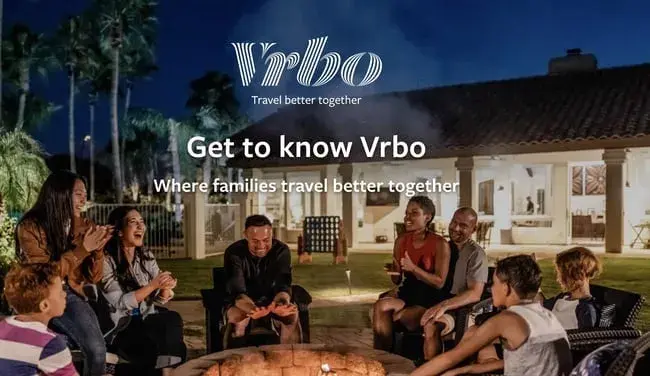
Vacation rental company VRBO has successfully carved out a family-friendly niche within the hospitality sector. Their slogan and corresponding tagline ‘Travel Better Together’ work to drive their mission: to find every family a space to relax, reconnect and enjoy their time together.
What I like: VRBO’s tagline is not only catchy, but its focus on families sets them apart from the competition in the vacation rental space.
6. Dollar Shave Club: “Shave Time. Shave Money.”
The folks at Dollar Shave Club have made their way onto quite a few of our lists here on the blog, and it‘s safe to say that when it comes to marketing and advertising, this brand’s team knows what it’s doing. And its slogan — “Shave Time. Shave Money.” — is an excellent reflection of their expertise.
What I like: This little quip cleverly incorporates two of the service‘s benefits: cost and convenience. It’s punny, to the point, and it perfectly represents the overall tone of the brand.
7. MasterCard: “There are some things money can‘t buy. For everything else, there’s MasterCard.”
MasterCard’s two-sentence slogan was created in 1997 as a part of an award-winning advertising campaign that ran in 98 countries and 46 languages.
The very first iteration of the campaign was a TV commercial that aired in 1997: “A dad takes his son to a baseball game and pays for a hot dog and a drink, but the conversation between the two is priceless,” wrote Avi Dan for Forbes.
“In a sense, ‘Priceless’ became a viral, social campaign years before there was a social media,” Dan explained. Today, “Priceless” is widely considered MasterCard’s tagline — borne out of the longer mission-focused slogan stated above.
What I like: Each commercial elicits an emotional response from the audience, and I don’t mean the sound you just made when you heard that two baseball game tickets cost under $30.
That first TV commercial might remind you of sports games you went to with your dad, for example. Each advertisement attempted to trigger a different memory or feeling. “You have to create a cultural phenomenon and then constantly nurture it to keep it fresh,” MasterCard CMO Raja Rajamannar told Dan.
And nostalgia marketing like that can be a powerful tool.
8. M&M: “Melts in Your Mouth, Not in Your Hands”
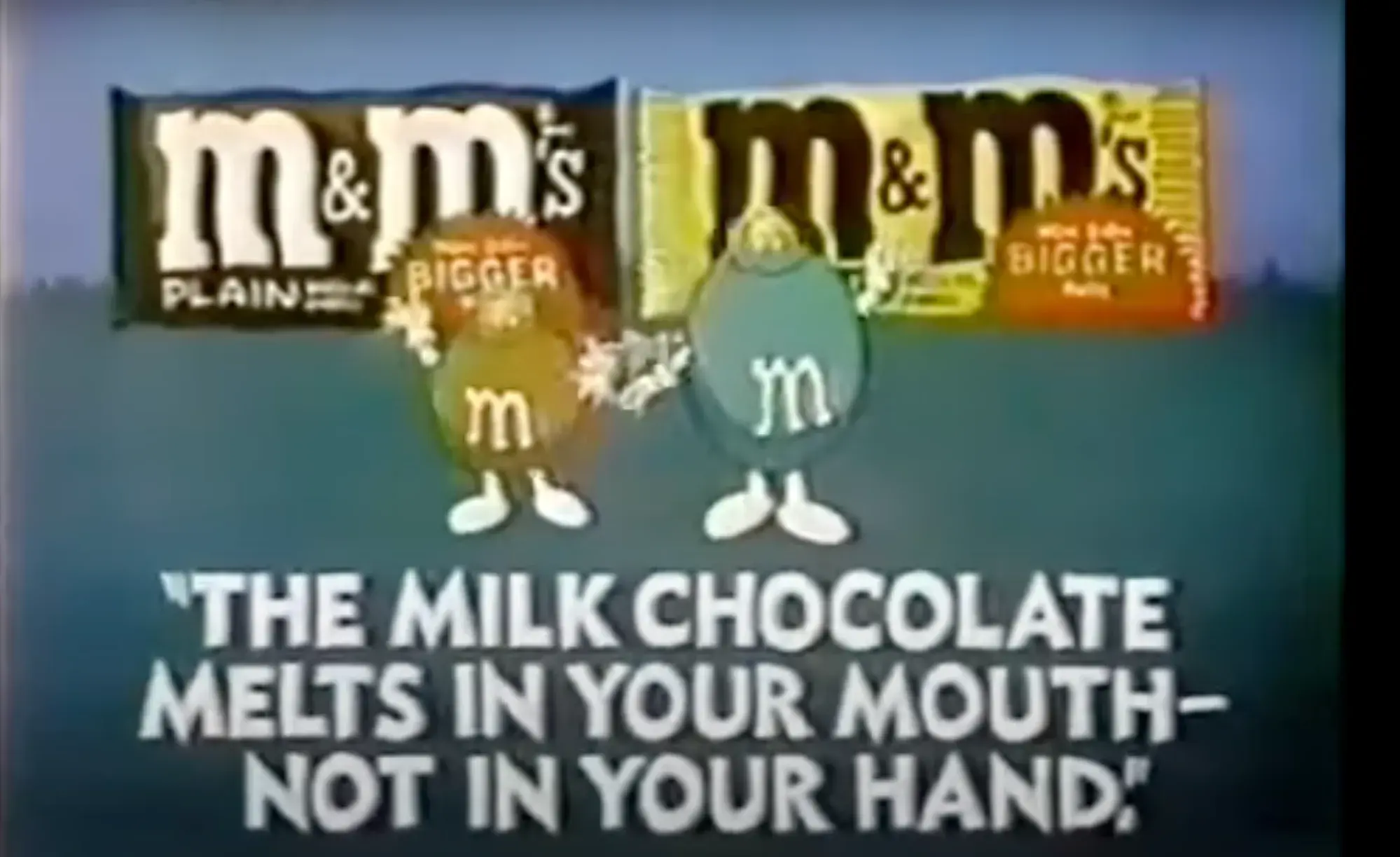
Here‘s one brand that didn’t need much time before realizing its core value proposition. At the end of the day, chocolate is chocolate. How can one piece of chocolate truly stand out from another? By bringing in the convenience factor, of course.
What I like: This particular example highlights the importance of finding something that makes your brand different from the others — in this case, the hard shell that keeps chocolate from melting all over you.
9. De Beers: “A Diamond is Forever”
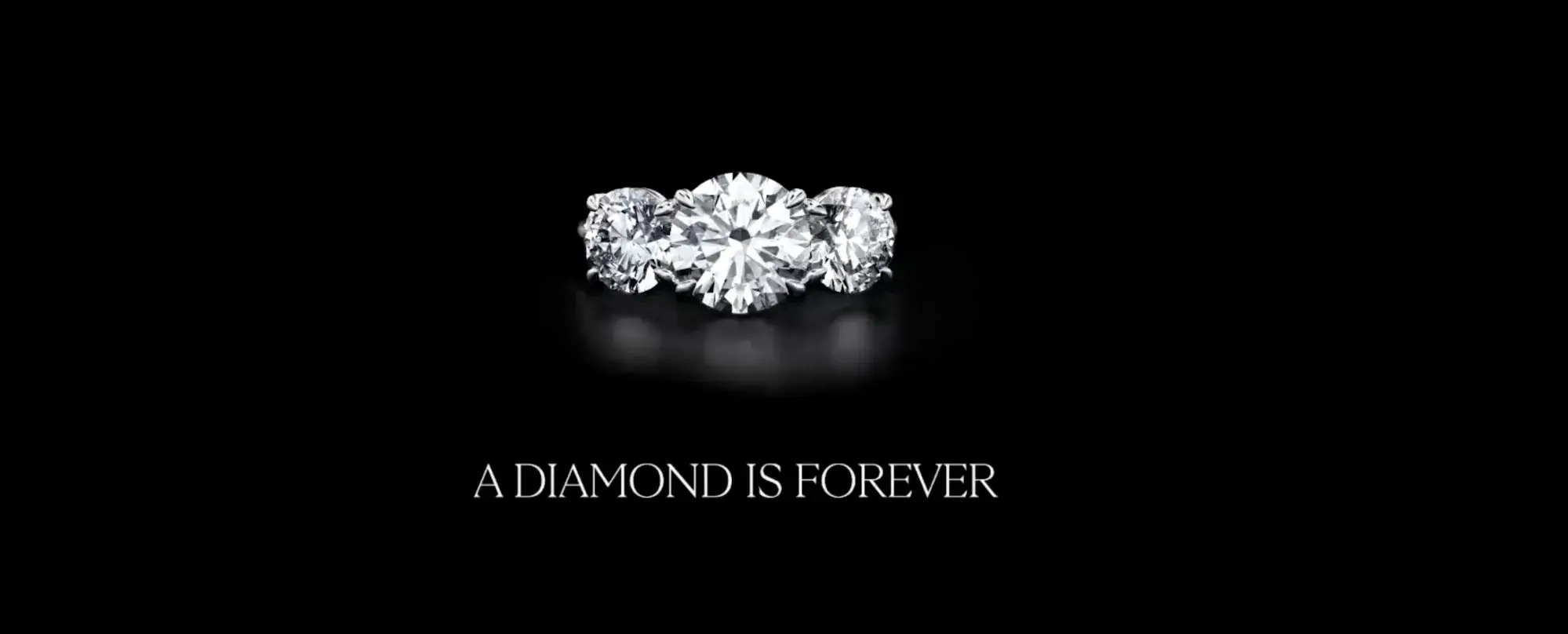
Diamonds aren’t inherently worth much. In an astounding piece of journalism from 1982, Edward Jay Epstein wrote in The Atlantic that diamonds are “a mechanism for converting tiny crystals of carbon into universally recognized tokens of wealth, power, and romance.”
That’s largely thanks to a brilliant, multifaceted (see what I did there) marketing strategy designed and executed by ad agency N.W. Ayer in the early 1900s for its client, De Beers.
The four, iconic words “A Diamond is Forever” have appeared in every single De Beers advertisement since 1948, and AdAge named it the best slogan of the century in 1999.
What I like: It connects tiny crystals of carbon with the hopes and dreams that your relationship will last forever. It also helped discourage people from ever reselling their diamonds. (Mass reselling would disrupt the market and reveal the alarmingly low intrinsic value of the stones themselves.) Brilliant.
10. Meow Mix: “Tastes So Good, Cats Ask for It by Name”
Meow meow meow meow … who remembers this catchy tune sung by cats, for cats, in Meow Mix’s television commercials? The brand released a simple but telling slogan: “Tastes So Good, Cats Ask For It By Name.”
What I like: This slogan plays off your cat’s natural chattiness around mealtime. It was not only clever, but it also successfully planted Meow Mix as a standout brand in a cluttered market (or is that meow-ket?).
11. Allstate: “You’re in Good Hands With Allstate”
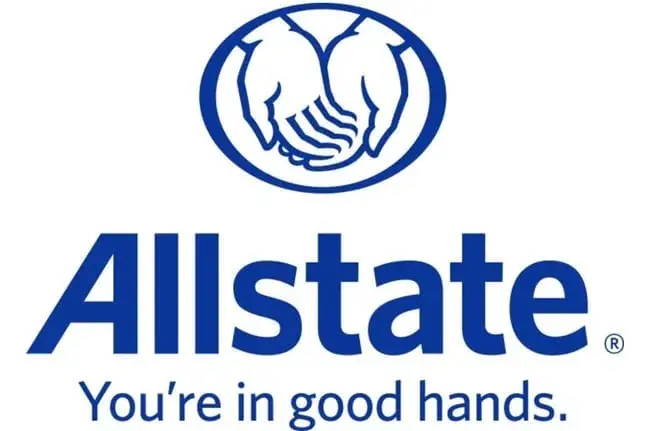
If there’s one thing people want from an insurance company, it’s reliability. Who wouldn’t be put at ease after hearing “You’re in good hands with Allstate”? It’s worked so well the slogan has been in service for nearly six decades.
What I like: It has its roots in a real experience and real emotion. Davis Ellis came up with the slogan in 1950 after his daughter had a health scare. Remembering how being told “JoAnn [his daughter] is in good hands with Dr. Keyser” relieved his anxiety, Ellis was inspired to use the phrase in an ad campaign.
Variations of this phrase have been used in the company slogan ever since.
12. Ronseal: “It Does Exactly What It Says on the Tin.”
Ronseal is a wood stain and dye manufacturer from the United Kingdom, and its 20-year-old slogan, well, it does exactly what it promises.
What I like: Ronseal‘s slogan doesn’t make lofty promises to its customers — it simply endorses a functional product. Too many companies try to break through the noise of their competitors by being so loud and ambitious, they forget what they stood for in the first place. Ronseal saw true value in basic reliability, and its customers do, too.
13. The Mosaic Company: “We Help the World Grow the Food It Needs”
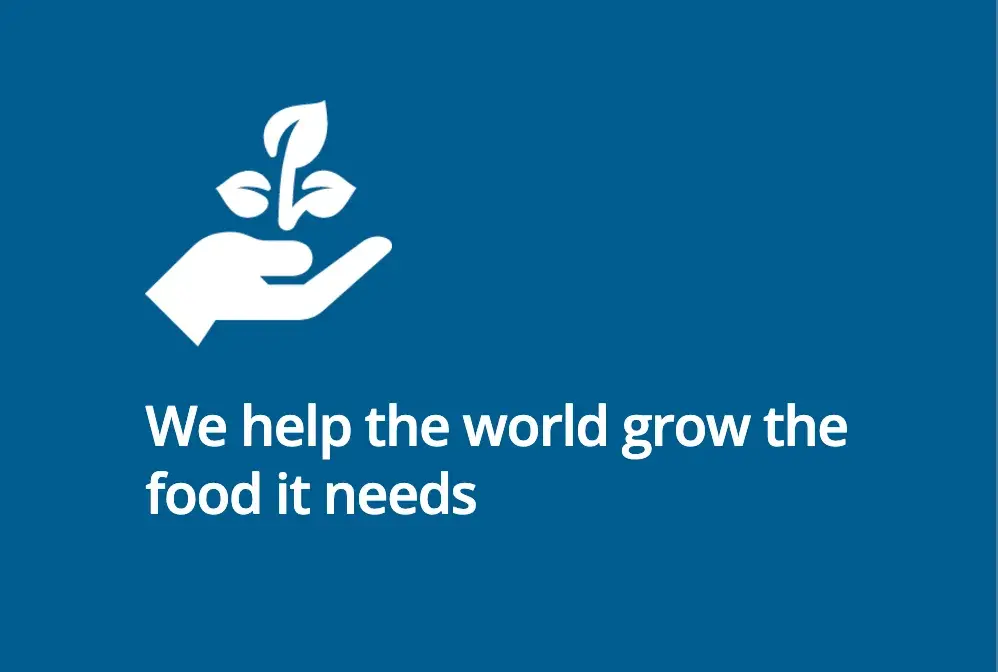
The Mosaic Company’s slogan also happens to be its mission statement, which guarantees that this fertilizer maker‘s brand strategy aligns with the company’s main interests.
What I like: A great slogan looks past the needs of the company and even customers, and it describes how the product or service helps the community. “We Help the World Grow the Food It Needs” expresses not just what The Mosaic Company wants for its customers, but also what it wants for the world.
Taglines
When creating your brand tagline, you want to convey your value to customers (and potential customers) in just one or two sentences. The right tagline will be concise while still containing the brand’s promise.
Below are some taglines that I think are great examples of this.
14. Target: “Expect More. Pay Less.”
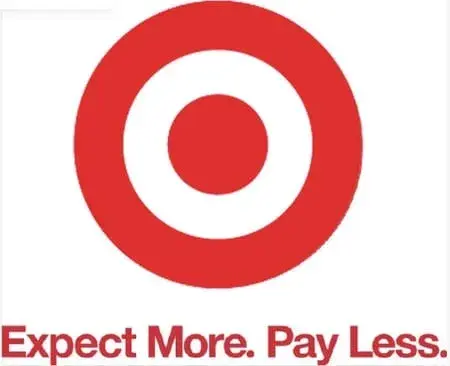
Target has been using its tagline since 1994 and the brand has developed a dedicated following ever since. Its stores and branding makes people feel like it’s cut above other big-box stores.
What I like: This tagline embodies the experience of shopping at Target — more premium than its competitors, but with competitive prices. And it does that in just four words.
15. Nike: “Just Do It”
It’s a classic for a reason. “Just Do It” hovers over every product and event Nike creates or sponsors and has been synonymous with the brand for more than 25 years.
But it‘s unlikely Kennedy + Weiden, the agency behind this tagline, knew from the start that Nike would brand itself in this way. In fact, Nike’s product used to cater almost exclusively to marathon runners, which are among the most hardcore athletes out there.
The “Just Do It” campaign widened the funnel, and it’s proof positive that some brands need to take their time coming up with a tagline that reflects their message and resonates with their target audience
What I like: “Just Do It” transformed the brand from just a seller of athletic apparel to a state of mind. It encourages even the non-athletes among us to put on a pair of running shoes and head outside.
16. Apple: “Think Different.”
This tagline was first released in the Apple commercial called “Here’s to the Crazy Ones, Think Different,” a tribute to time-honored visionaries who challenged the status quo. The phrase itself is a bold nod to IBM’s campaign “Think IBM,” which was used at the time to advertise its ThinkPad.
Soon after, the tagline “Think Different” accompanied Apple advertisements all over the place, even though Apple hadn’t released any significant new products at the time.
All of a sudden, people began to realize that Apple wasn’t just any old computer; it was so powerful and so simple to use that it made the average computer user feel innovative and tech-savvy.
According to Forbes, Apple‘s stock price tripled within a year of the commercial’s release. Although the tagline has been since retired, many Apple users still feel a sense of entitlement for being among those who “think different.”
What I like: Favorably comparing your brand to figures like Martin Luther King, Jr. and Mahatma Gandhi is a helluva gamble (and one that I wouldn’t necessarily recommend today). But with Apple’s first “Think Different” ad, it established that its slogan had high stakes — it didn’t just make computers, it was a visionary company that challenged social norms.
17. L‘Oréal: “Because You’re Worth It”

Who doesn‘t want to feel like they’re worth it? The folks at L’Oréal worked with the theory that women wear makeup in order to make themselves appear “beautiful” so they feel desirable, wanted, and worth it.
What I like: The tagline isn‘t about the product — it’s about the image the product can deliver for you. This message allowed L’Oréal to push a much more powerful message for something that many would consider frivolous or superficial.
18. California Milk Processor Board: “Got Milk?”
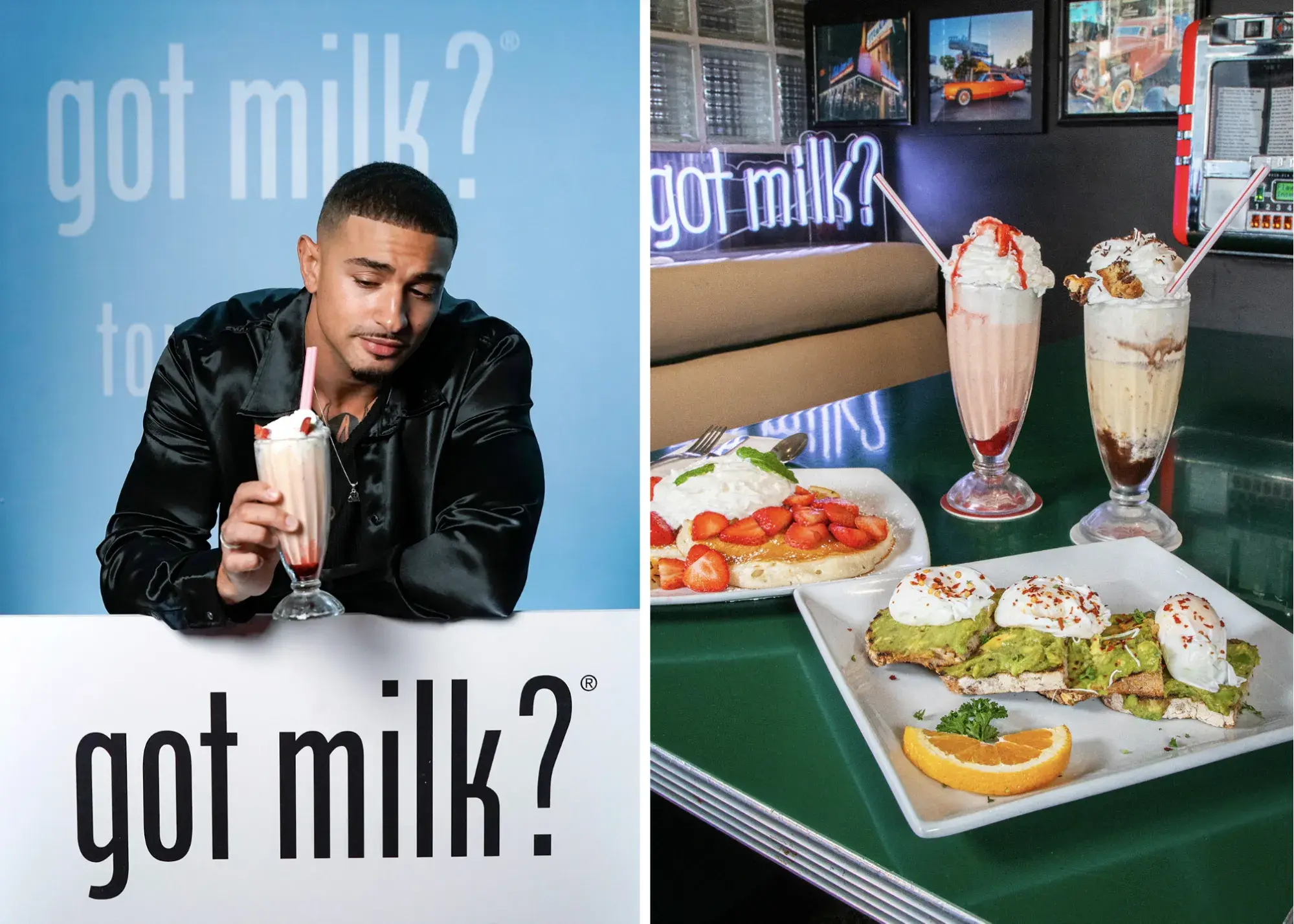
While most people are familiar with the “Got Milk?” campaign, not everyone remembers that it was launched by the California Milk Processor Board (CMPB) to combat the rapid increase in fast food and soft beverages.
The campaign was meant to bring some life to a “boring” product, ad executives told TIME Magazine.
The simple words “Got Milk?” scribbled above celebrities, animals, and children with milk mustaches ran from 2003 until 2014.
What I like: The campaign intentionally echoed the U.S. government’s recommendations to drink milk every day. Its simplicity and relatability have kept it memorable well past its expiration date.
19. BMW: “Sheer Driving Pleasure”
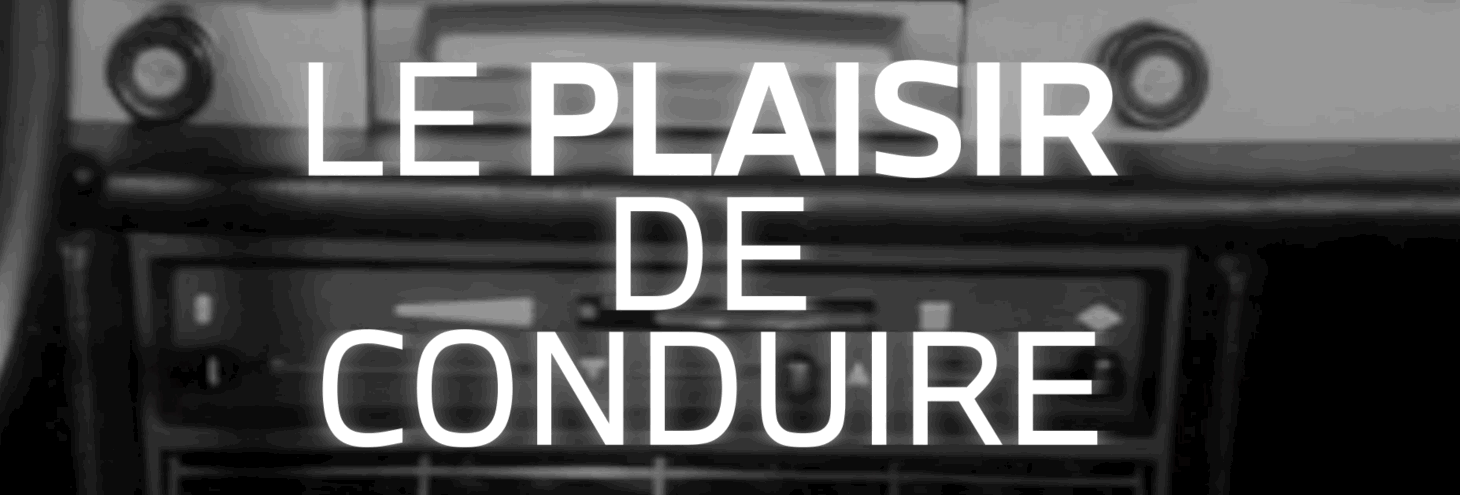
BMW sells cars all over the world, but in North America, it was known for a long time by the tagline “The Ultimate Driving Machine.”
This phrase was created in the 1970s by a relatively unknown ad agency named Ammirati & Puris and was, according to BMW’s blog, directed at Baby Boomers who were “out of college, making money and ready to spend their hard-earned dollars. What better way to reflect your success than on a premium automobile?”
What I like: BMW’s newer tagline, “Sheer Driving Pleasure,” is intended to reinforce the message that its cars’ biggest selling point is that they are performance vehicles that are thrilling to drive. That message is an emotional one and one that justifies its higher prices for consumers looking for a fun ride.
20. Tesco: “Every Little Helps”
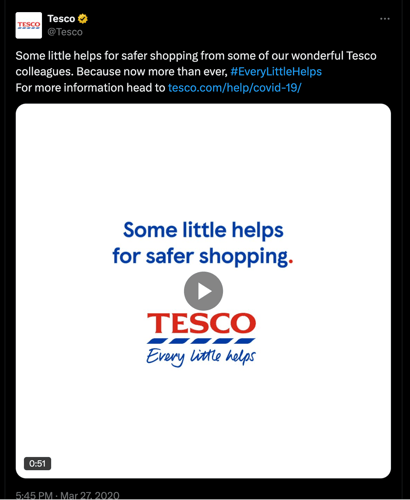
“Every little helps” is flexible enough to fit in with any one of Tesco’s messages — it can refer to value, quality, service, and even environmental responsibility.
What I like: As Naresh Ramchandani wrote for The Guardian, this tagline is “perhaps the most ingeniously modest” slogan or tagline ever written. Tesco markets itself as a brand for the people, and a flexible, modest far-reaching slogan like this one reflects that beautifully.
21. Bounty: “The Quicker Picker Upper”
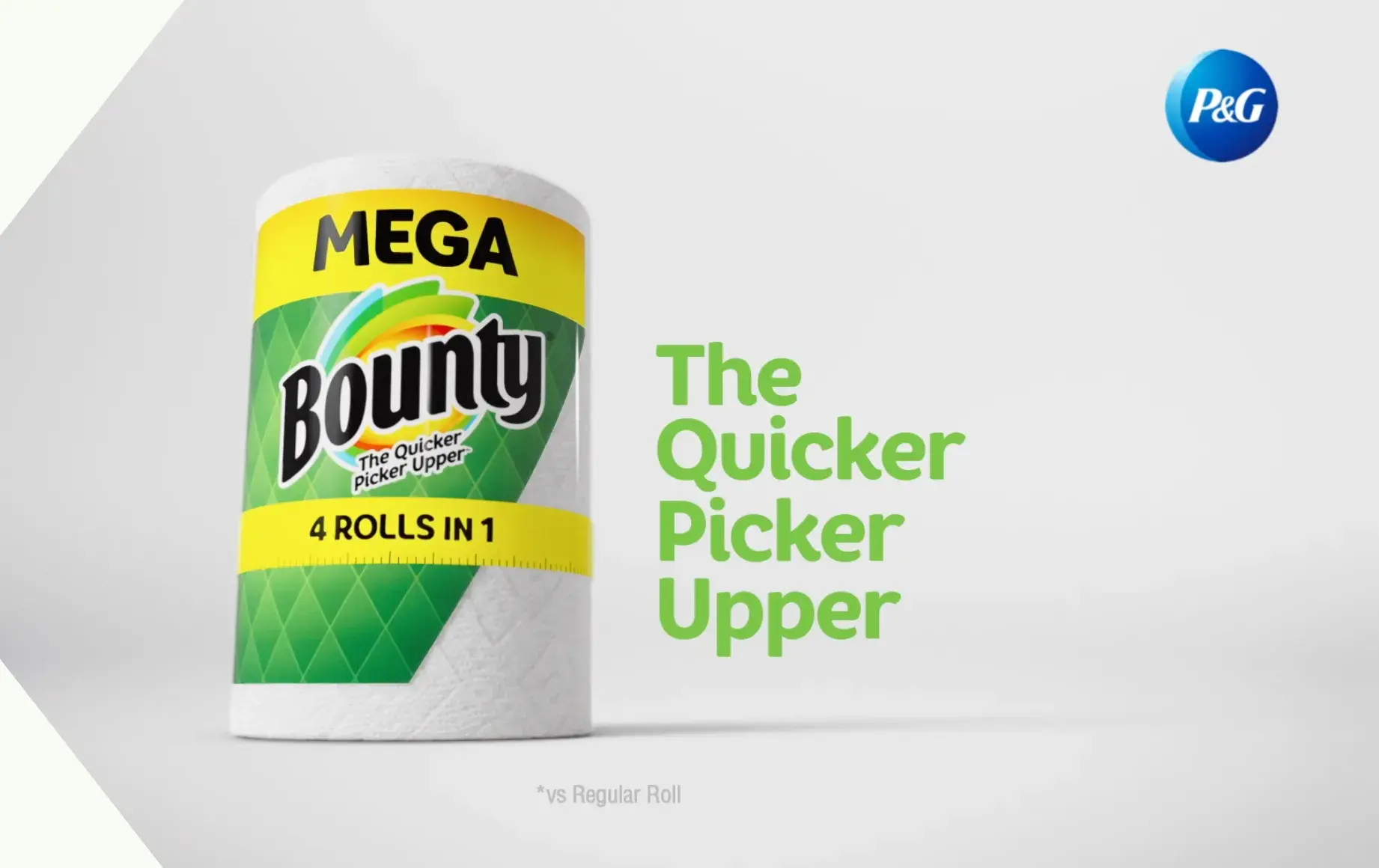
Bounty paper towels, made by Procter & Gamble, has used its catchy tagline “The Quicker Picker Upper” for more than 50 years.
If it sounds like one of those sing-songy play on words you learned as a kid, that‘s because it is one: The tagline uses what’s called consonance — a poetic device characterized by the repetition of the same consonant two or more times in short succession (think: “pitter patter”).
Over the years, Bounty has moved away from this tagline in full, replacing “Quicker” with other adjectives, depending on the brand‘s current marketing campaign — like “The Quilted Picker Upper” and “The Clean Picker Upper.”
Although the brand is branching out into other campaigns, they’ve kept the theme of their original, catchy tagline.
What I like: Not unlike HobNobs’ catchy slogan, “The Quicker Picker Upper” is just a lot of fun to say. It conveys the brand promise in four words, and the consonance makes it easy to remember.
22. Lay‘s: “Betcha Can’t Eat Just One.”
Seriously, who here has ever had just one chip? While this tagline might not distinguish Lay’s from other crispy snacks, the company tapped into our truly human incapability to ignore crunchy, salty goodness when it’s staring us in the face. Carbs, what a tangled web you weave.
What I like: Notice how the emphasis isn‘t on the taste of the product. There are plenty of other delicious chips out there, but Lay’s tagline homes in on the relatability of snacking (and snacking and snacking).
23. Dunkin’: “America Runs on Dunkin”
In April 2006, Dunkin‘ Donuts launched the most significant repositioning effort in the company’s history by unveiling a brand new, multi-million dollar advertising campaign under the tagline “America Runs on Dunkin.”
The campaign revolves around Dunkin’ Donuts coffee keeping busy Americans fueled while they are on the go.
What I like: The new tagline takes a beloved regional coffee and doughnuts chain and makes it nation-wide in just four words. The press release nails it: “The new campaign is a fun and often quirky celebration of life, showing Americans embracing their work, their play and everything in between — accompanied every step of the way by Dunkin’ Donuts.”
24. McDonald’s: “I’m Lovin’ It”
The “I‘m Lovin’ It” campaign was launched in 2003 and still stands strong today. Fun fact: The jingle’s infamous hook — “ba da ba ba ba” — was originally sung by Justin Timberlake.
What I like: This is a great example of a tagline that resonates with the brand‘s target audience. McDonald’s food might not be the healthiest choice, but being healthy isn‘t the benefit McDonald’s is promising — it‘s that you’ll love the taste and the convenience.
25. The New York Times: “All the News That’s Fit to Print”
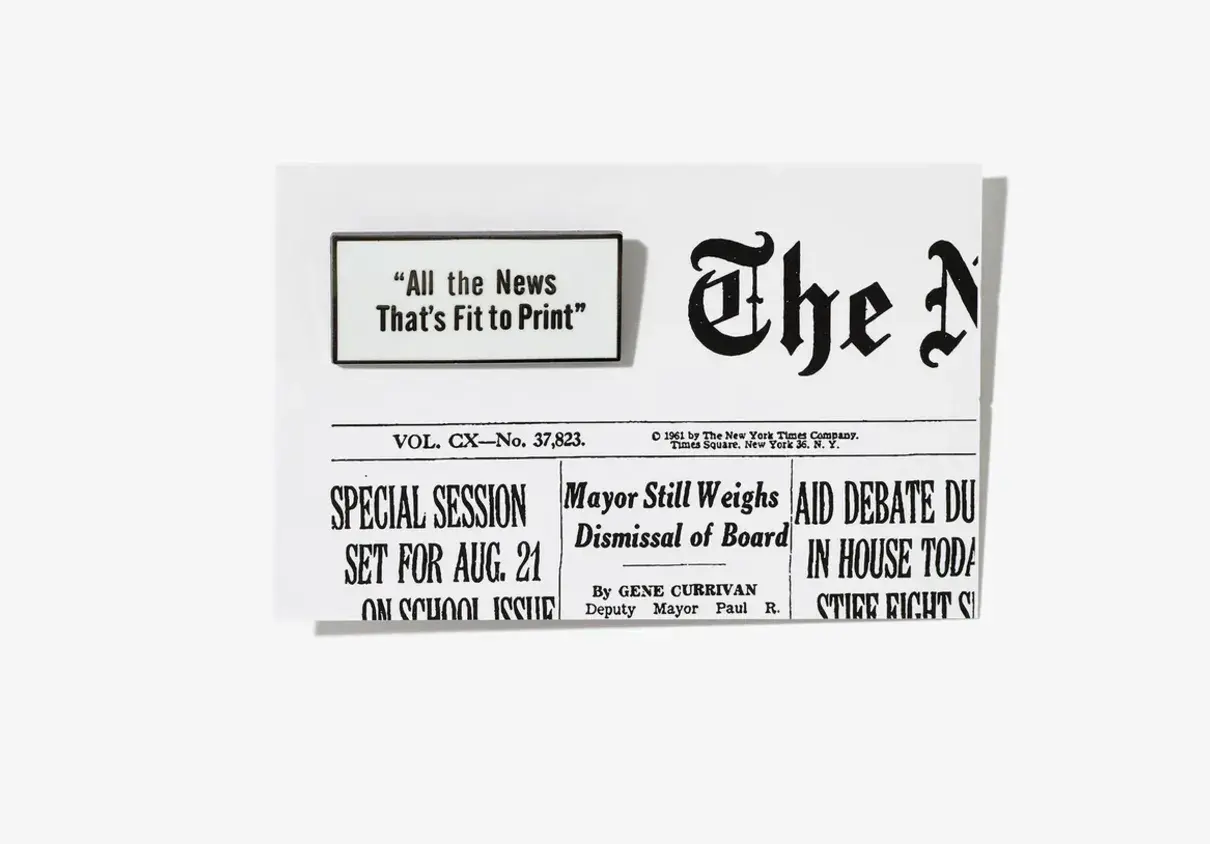
This one is my personal favorite. The tagline was created in the late 1890s as a movement of opposition against lurid journalism. The New York Times didn’t stand for sensationalism. Instead, it focused on important facts and stories that would educate its audience. It literally deemed its content all the real “news fit to print.”
This helped the paper become more than just a news outlet, but a company that paved the way for credible news. The company didn’t force a tagline upon people when it first was founded, but rather, it created one in a time where it was needed most.
What I like: This tagline works both literally and figuratively. And who can resist a good double entendre?
26. General Electric: “Imagination at Work”
You may remember General Electric‘s former tagline, “We Bring Good Things to Life,” which launched in 1979.
Although this tagline was well-known and well-received, the new tagline — “Imagination at Work” — shows how a company’s internal culture can revolutionize how it sees its own brand.
“‘Imagination at Work’ began as an internal theme at GE,” recalled Tim McCleary, GE‘s manager of corporate identity. When Jeff Immelt became CEO of GE in 2001, he announced that his goal was to reconnect with GE’s roots as a company defined by innovation.
This culture and theme resulted in a rebranding with the new tagline “Imagination at Work,” which embodies the idea that imagination inspires the human initiative to thrive at what we do.
What I like: GE’s tagline speaks to its customers, but it also nods to all the people who make the company what it is.
27. State Farm: “Like a good neighbor, State Farm is there.”
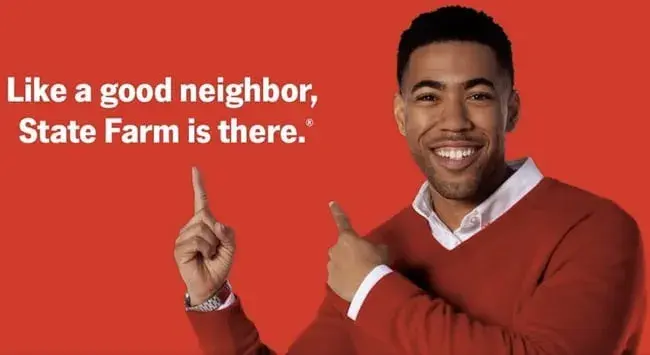
The insurance company State Farm has a number of taglines, including “Get to a better State” and “No one serves you better than State Farm.” Additionally, the company updated its tagline to “We’re here to help life go right.”
But State Farm‘s most famous tagline is the jingle, “Like a good neighbor, State Farm is there,” written in 1971 by none other than Barry “Copa, Copacabana” Manilow.
Often, customers need insurance when they least expect it — and in those situations, State Farm is responding in friendly, neighborly language.
What I like: These words emphasize State Farm’s “community-first” value proposition — which sets it apart from the huge, bureaucratic feel of most insurance companies. Plus, it quickly establishes a close relationship with the consumer.
28. Maybelline: “Maybe she‘s born with it. Maybe it’s Maybelline.”
Can you sing this jingle in your head? Maybelline’s ’90s tagline evokes glossy magazine pages and OG supermodels with long lashes staring straight down the lens
Maybelline changed its tagline to “Make IT Happen” in February 2016, inspiring women to “express their beauty in their own way.” Despite this change, the former tagline remains powerful and ubiquitous, especially among the many generations that grew up with it.
What I like: Maybelline, like L’Oreal, taps into emotion. Instead of focusing on superficial beauty, it zeros in on confidence.
29. The U.S. Marine Corps: “The Few. The Proud. The Marines.”
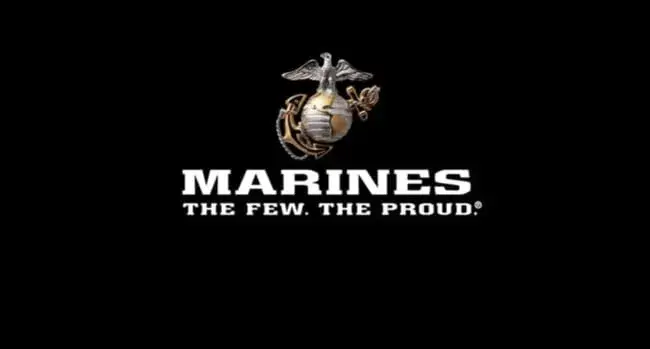
While “Semper Fi” is one the U.S. Marine Corps’ best-known mottos, it’s had a handful of top-notch recruiting taglines over the decades. These include “First to fight” starting in World War I and “We’re looking for a few good men” from the 1980s.
However, we’d argue that “The Few. The Proud. The Marines.” is among the best organization taglines out there. In 2007, it even earned a spot on Madison Avenue’s Advertising Walk of Fame.
What I like: This tagline “underscores the high caliber of those who join and serve their country as Marines,” said Maj. Gen. Richard T. Tryon, former commanding general of Marine Corps Recruiting Command. It suggests that by joining the Marines, you’re joining an exclusive, elite club.
30. Capital One: “What’s in Your Wallet?”
Capital One launched its iconic “What’s in your wallet?” tagline in 2000. Since then, it’s been used in many of the credit card company’s ad campaigns, which have featured celebrity spokespeople like Samuel L. Jackson and Jennifer Garner.
What I like: The simplicity of asking “what’s in your wallet?” underscores the usefulness of a credit card over cash, but it also establishes Capital One as a premium brand for its customers.
31. Toyota: “Let’s Go Places”
In 2012, Toyota replaced its old tagline “Moving Forward” with its current one “Let’s Go Places.”
Upon the tagline’s launch, GVP of Toyota Division Bill Fay said, “the phrase conveys a dual meaning of physically going places and taking off an adventure, while also expressing optimism and the promise of exciting innovation that enriches people’s lives.”
What I like: “Let’s Go Places” invites you to explore and discover with Toyota, creating a stronger relationship between the brand and its consumers. This tagline encourages you to dream big and make moves, assuring you that Toyota will be there with you every step of the way.
A catchy slogan and tagline will make a difference in your business.
Now that you have delved into some classic and catchy slogans and taglines, it’s time to set your business up for success.
Remember a slogan and a tagline are similar but a slogan is used to sell an item whereas a tagline brings awareness to the item while being concise, catchy, and classic.
Both are essential when making sure your business will remain in the minds of consumers.

